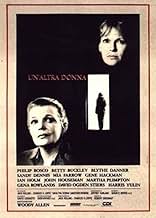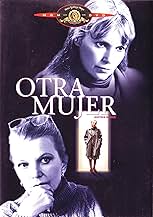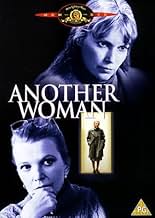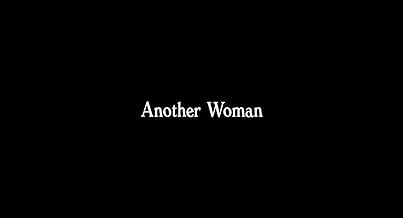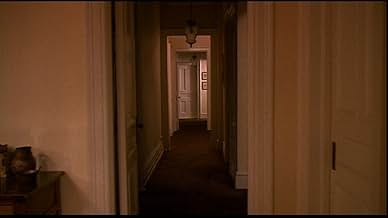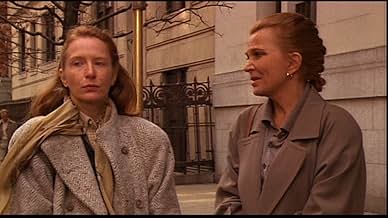AVALIAÇÃO DA IMDb
7,2/10
16 mil
SUA AVALIAÇÃO
Enfrentando uma crise de meia-idade, uma mulher aluga um apartamento ao lado do consultório de um psiquiatra para escrever um novo livro, e se vê atraída pela situação de uma mulher grávida ... Ler tudoEnfrentando uma crise de meia-idade, uma mulher aluga um apartamento ao lado do consultório de um psiquiatra para escrever um novo livro, e se vê atraída pela situação de uma mulher grávida que busca a ajuda desse médico.Enfrentando uma crise de meia-idade, uma mulher aluga um apartamento ao lado do consultório de um psiquiatra para escrever um novo livro, e se vê atraída pela situação de uma mulher grávida que busca a ajuda desse médico.
- Direção
- Roteirista
- Artistas
- Prêmios
- 1 vitória e 3 indicações no total
Avaliações em destaque
This is by far my favorite Woody Allen straight drama (most of his other "serious" films, like Crimes and Misdemeanors and Husbands & Wives, have comedic moments). His third "heavy film" (after Interiors and September) is chamber drama, beautifully acted and directed. Most of the elements found in Allen's other post "Annie Hall" films are here (the upper crust Manhattan intellectuals, dysfunctional relationships), but what's missing are the laughs. The film is very serious stuff, involving repressed emotions and alienation. There is simply no place for Woody's usually nervous character in Another Woman. You can still tell that this is one of his films because of the characterizations. Gena Rowlands is in nearly every scene and is classy, as usual, and the rest of the ensemble cast is just as good. My favorites were Gene Hackman and Ian Holm. The title is fairly clever as well; it doesn't refer to what you might think.
I just watched this last night, and I've been thinking about it all day. What an amazing film! So poignant, so subtle. A woman re-evaluates her life and begins to lament the choices she made years ago. Such a simple premise, such immense possibilities.
This film demands a lot of its audience. There is no humor, no action, and very little plot. Most people won't be into this at all, I imagine, which is a shame. This film offers a really wonderful perspective on a subject that is so very rarely addressed in films today: aging. This film is about a woman taking stock of her life at the age of fifty. She looks back, she sees the choices she made and how they turned out. She sees the compromises she made to get where she is today (very successful, head of a philosophy department, about to write another book), and she begins to appreciate, for the first time, what those compromises cost.
This is, in my opinion, the central tragedy of human existence. You only get one shot at life, and no one ever tells you how to manage it. So, you make mistakes, and one day, when you're fifty, you've finally learned enough to start making the right choices. But, by that time, is it too late? This film doesn't answer that question, at least not for its central character. But it does offer hope.
The film is propelled by several dynamite performances. But, even in such a crowded field of great performances, it is not difficult to pick out Gena Rowlands, who gives an unforgettably nuanced performance as Marion, the film's central character.
You may notice that this film is propelled by a number of coincidences. Every chance encounter, however, has an eerie relevance to Marion's soul-searching. It may look contrived, but it isn't. These aren't coincidences at all. The pregnant woman, played by Mia Farrow, is instrumental in setting up each of these 'coincidences', and that character's name is Hope. I was half-expecting a "Fight Club" revelation at the end, but it never came, which is good. This film could stand both ways, and it's better for the director to leave the audience to consider the relationship between Hope and Marion on their own. Like I said, I've been thinking about it all day.
This film demands a lot of its audience. There is no humor, no action, and very little plot. Most people won't be into this at all, I imagine, which is a shame. This film offers a really wonderful perspective on a subject that is so very rarely addressed in films today: aging. This film is about a woman taking stock of her life at the age of fifty. She looks back, she sees the choices she made and how they turned out. She sees the compromises she made to get where she is today (very successful, head of a philosophy department, about to write another book), and she begins to appreciate, for the first time, what those compromises cost.
This is, in my opinion, the central tragedy of human existence. You only get one shot at life, and no one ever tells you how to manage it. So, you make mistakes, and one day, when you're fifty, you've finally learned enough to start making the right choices. But, by that time, is it too late? This film doesn't answer that question, at least not for its central character. But it does offer hope.
The film is propelled by several dynamite performances. But, even in such a crowded field of great performances, it is not difficult to pick out Gena Rowlands, who gives an unforgettably nuanced performance as Marion, the film's central character.
You may notice that this film is propelled by a number of coincidences. Every chance encounter, however, has an eerie relevance to Marion's soul-searching. It may look contrived, but it isn't. These aren't coincidences at all. The pregnant woman, played by Mia Farrow, is instrumental in setting up each of these 'coincidences', and that character's name is Hope. I was half-expecting a "Fight Club" revelation at the end, but it never came, which is good. This film could stand both ways, and it's better for the director to leave the audience to consider the relationship between Hope and Marion on their own. Like I said, I've been thinking about it all day.
This is a wonderful movie but not an easy one. It mixes the present with the past and dreams with real life. You will need to see it three or four times at least to get the best out of it but it's well worth doing. Every performance is spot on, every scene has a purpose, there is no padding here. It comes as a shock to Gena Rowlands character that she is not what she thought she was, that people do not view her in the way she thought they did.She takes a journey through her life to see what went wrong with the unwitting aid of a psychiatrist and patient in the apartment next door. The film ends abruptly without a proper resolution just as life can and does. The final line of Gena Rowlands beautiful narration will haunt you. A masterpiece of writing and direction to say nothing of superb acting and masterful cinematography.
10canadude
It's worth noting that in 1978, ten years before he made "Another Woman," Woody Allen created another quiet film, a drama with prominent Bergmanesque influences. The film was called "Interiors," and it was a tribute, or an American take on Bergman's "Cries and Whispers." "Interiors" examined the relationships of three sisters and their husbands in the face of the divorce of their dominant mother and detached father. The film essentially detailed the fall of "interiors," or illusory worlds created by the dominant mother in the face of tragedy and loneliness.
"Another Woman," made ten years later, shares similar themes with "Interiors," but it is more akin to Bergman's "Wild Strawberries" than to "Cries and Whispers." It is a story of a university professor, played spectacularly by Gena Rowlands, in whom something stirs when she overhears a therapy session with a young 30-something woman who is discontent with her life. The professor, Marion, feels an emptiness rise inside her - an emptiness that had settled there years before, that she can consciously feel now. Little by little, like in "Interiors," the world she has constructed for herself, a cold, cerebral world, deconstructs.
Marion despairs, enters into conflicts with herself, and questions endlessly trying to reason her way out of her malaise. But the cure for her malaise is not rational resolution and she, realizing that her strongest characteristic (namely her rational intelligence) is not enough to untangle what worries her, finds herself entirely helpless in the face of an unraveling existence.
Her drama is very much like the drama of Professor Isak Borg from Bergman's film, a man on his way to receive a medal for his lifetime achievements. And, on the road, he also succumbs to the same malaise as Marion, the same questioning and the same painful re-evaluation. The horror shared by both Marion and Professor Borg, of course, is that despite their highly lauded accomplishments and their intellectual self-satisfaction, they feel void. There must, in other words, be something else to life than strictly intellectual work, however satisfying it may be.
In Bergman (both "Cries and Whispers" and "Wild Strawberries") and in Allen (both "Interiors" and "Another Woman") life falls under question. The entire existence is evaluated, its worth and meaning doubted. In "Interiors" and "Cries and Whispers," however, the meaninglessness pervades everything in the films - the dialogues, behaviors and even visuals. The sisters in "Interiors" shatter the mother's reality and find nothingness - they continue as they were, much like the two sisters in "Cries and Whispers" for whom the death of their young sister changed absolutely nothing, and only confirmed their beliefs about the world.
However, "Another Woman" is not as stark (though it is stark indeed at times). Marion grabs at the chance to re-evaluate the life she feels she painfully wasted and tries to start again. It's not a false choice, or a gimmick on Allen's part, but it's a true depiction of Marion's sincere desire to continue to struggle because her life does have value for her. She rediscovers a passion for the struggle and her motivation is the same curiosity that made her go through the questioning process in the first place.
"Another Woman" is a testament to the fact that Woody Allen was still at the top of his game in the late 1980s. It is a brilliant, honest and (surprisingly) warm film. It is not a remake or rip-off of Bergman's work, though it is highly influenced by him (which shouldn't seem so surprising to anyone, because Bergman himself was influenced by the most basic questions of existence). "Another Woman" is an existential film that is both uncompromising and not hopeless. It's one of my favorite Woody Allen films and it reveals to us not only a great American director, but one whose films are of worldly greatness.
"Another Woman," made ten years later, shares similar themes with "Interiors," but it is more akin to Bergman's "Wild Strawberries" than to "Cries and Whispers." It is a story of a university professor, played spectacularly by Gena Rowlands, in whom something stirs when she overhears a therapy session with a young 30-something woman who is discontent with her life. The professor, Marion, feels an emptiness rise inside her - an emptiness that had settled there years before, that she can consciously feel now. Little by little, like in "Interiors," the world she has constructed for herself, a cold, cerebral world, deconstructs.
Marion despairs, enters into conflicts with herself, and questions endlessly trying to reason her way out of her malaise. But the cure for her malaise is not rational resolution and she, realizing that her strongest characteristic (namely her rational intelligence) is not enough to untangle what worries her, finds herself entirely helpless in the face of an unraveling existence.
Her drama is very much like the drama of Professor Isak Borg from Bergman's film, a man on his way to receive a medal for his lifetime achievements. And, on the road, he also succumbs to the same malaise as Marion, the same questioning and the same painful re-evaluation. The horror shared by both Marion and Professor Borg, of course, is that despite their highly lauded accomplishments and their intellectual self-satisfaction, they feel void. There must, in other words, be something else to life than strictly intellectual work, however satisfying it may be.
In Bergman (both "Cries and Whispers" and "Wild Strawberries") and in Allen (both "Interiors" and "Another Woman") life falls under question. The entire existence is evaluated, its worth and meaning doubted. In "Interiors" and "Cries and Whispers," however, the meaninglessness pervades everything in the films - the dialogues, behaviors and even visuals. The sisters in "Interiors" shatter the mother's reality and find nothingness - they continue as they were, much like the two sisters in "Cries and Whispers" for whom the death of their young sister changed absolutely nothing, and only confirmed their beliefs about the world.
However, "Another Woman" is not as stark (though it is stark indeed at times). Marion grabs at the chance to re-evaluate the life she feels she painfully wasted and tries to start again. It's not a false choice, or a gimmick on Allen's part, but it's a true depiction of Marion's sincere desire to continue to struggle because her life does have value for her. She rediscovers a passion for the struggle and her motivation is the same curiosity that made her go through the questioning process in the first place.
"Another Woman" is a testament to the fact that Woody Allen was still at the top of his game in the late 1980s. It is a brilliant, honest and (surprisingly) warm film. It is not a remake or rip-off of Bergman's work, though it is highly influenced by him (which shouldn't seem so surprising to anyone, because Bergman himself was influenced by the most basic questions of existence). "Another Woman" is an existential film that is both uncompromising and not hopeless. It's one of my favorite Woody Allen films and it reveals to us not only a great American director, but one whose films are of worldly greatness.
8sol-
Bergmanesque territory for Allen again, this is an intriguing and well directed film in Bergman's style, however unlike in some of Allen's earlier Bergman ventures this one feels like less of a copy and more so just a unique drama. The film is philosophical without the ideas seeming intangible, and some of the points are very interesting, like how the pain of others can cause one to realise one's own, and how fascinating it is to hear someone else's revelations. It is not a minute too long, and the dialogue is great, but if one was to flaw it, Allen's choice of music seems a little off-balance, the narration is a touch cold, and whilst not bad, the performances are generally rather ordinary. But all these problems are very slight, as the overall production is fascinating and thought-provoking stuff about how one reflects on oneself.
Você sabia?
- CuriosidadesWoody Allen is not known for complimenting his actors, saying that the fact that he casts them is proof that he considers them great. However, he has said that the scenes between Gena Rowlands and Gene Hackman, particularly in the flashback of the party, were "electrifying."
- Erros de gravaçãoWhilst it is true that the tune of Gymnopédie No. 1 is played at the beginning of the film, it is not the piano version but rather the orchestral version orchestrated by Debussy. For some unknown reason, Debussy changed the numbers of the Gymnopédies: thus the orchestral version of Gymnopédie No. 3 bears the tune of Gymnopédie No. 1!
- Trilhas sonorasGymnopédie No 1
Music by Erik Satie
Performed by Orchestre de la Société des Concerts du Conservatoire
Conducted by Louis Auriacombe
Courtesy of EMI Pathé-Marconi/Capitol Records Special Markets
Principais escolhas
Faça login para avaliar e ver a lista de recomendações personalizadas
- How long is Another Woman?Fornecido pela Alexa
Detalhes
Bilheteria
- Orçamento
- US$ 10.000.000 (estimativa)
- Faturamento bruto nos EUA e Canadá
- US$ 1.562.749
- Fim de semana de estreia nos EUA e Canadá
- US$ 75.196
- 16 de out. de 1988
- Faturamento bruto mundial
- US$ 1.562.749
Contribua para esta página
Sugerir uma alteração ou adicionar conteúdo ausente



